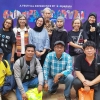Transportation Access: Small islands often struggle with inadequate transportation infrastructure, making it difficult for farmers to get their products to market. While major cities might see new airports or upgraded ports, small islands may lack even basic transportation facilities like reliable ferry services, roads, or bridges. This limits farmers' access to larger markets and can lead to post-harvest losses due to delays in transportation.
Agricultural Infrastructure: Investments in irrigation systems, storage facilities, and farm-to-market roads are essential for agricultural productivity but are often overlooked in favor of urban projects. This neglect can lead to inefficiencies in the agricultural sector, with farmers unable to fully realize the potential of their land due to lack of infrastructure.
Impact on Local Communities: The focus on urban projects at the expense of rural areas exacerbates economic disparities and perpetuates underdevelopment in small island communities. It also undermines the potential for sustainable agricultural development, which could provide long-term benefits not only for the local population but also for regional food security and economic stability.
A prime example of this disparity can be seen in the allocation of funds for ports and airports. While major cities in Maluku might receive substantial investments for new airports or port expansions to boost tourism or trade, smaller islands might struggle with basic ferry access. This lack of infrastructure not only hinders the distribution of agricultural products but also isolates these communities, making it harder for them to participate in broader economic activities.
Many regional leaders prefer to allocate budgets to urban infrastructure projects because they are perceived to offer greater political returns. The construction of highways, bridges, or government buildings in urban centers is easier to measure in terms of success and quickly influences popularity. For example, the construction of airports or ports in major cities is often prioritized, while transportation access to small islands, which is crucial for the distribution of agricultural products, receives less attention.
Regional elections often bring drastic policy changes depending on who is elected. Unfortunately, policies affecting the agricultural sector on small islands often lack consistency and sustainability.
In many cases, policies related to agricultural development on small islands change with each change in regional leadership. New leaders often alter the development priorities set by their predecessors, ignoring ongoing projects in the agricultural sector in favor of new programs deemed more politically advantageous. For example, in Aru Islands Regency, a program to develop agricultural land for food crops initiated by a previous regent was discontinued by the new regent, who preferred to develop marine tourism because it was seen as more economically and politically beneficial.
Existing agricultural policies are often temporary and not designed for the long term. Programs like seed or fertilizer aid are often only provided during election periods as a form of political "gift," but are not followed up with adequate training or ongoing technical support. Like giving fish without teaching how to fish, these programs only provide temporary assistance without building the long-term capacity of farmers.
When agriculture on small islands is neglected, the impact on the local community is significant. Not only do they lose their primary livelihood, but they also become trapped in poverty and dependency on external aid. Development disparities caused by policies that do not favor small island farmers result in economic injustice. Urban areas that receive larger budget allocations continue to progress, while villages on small islands fall further behind. Data from Bank Indonesia shows that poverty rates on small islands in Maluku are much higher than in urban areas. This is largely due to a lack of access to agricultural production facilities and supporting infrastructure such as irrigation and roads.
The lack of attention to the agricultural sector on small islands also triggers migration to major cities. People who see no future in their villages are forced to move to cities in search of better job opportunities, even if it means leaving behind their farms and gardens. Villages in the eastern part of Seram Island, once known for sago production, are now mostly abandoned by young residents who choose to migrate to Ambon or Jakarta because they see no bright future in their hometowns.
As an illustration, let's look at the agricultural development program on Seram island, which is an example of how the island's significant potential is not matched by appropriate policies. Seram Island has fertile soil and a climate conducive to agriculture, particularly for crops such as cloves, nutmeg, and coconuts. However, inadequate infrastructure, such as roads and markets, and a lack of technical support from the government mean this potential cannot be fully realized. Since 2010, there have been efforts to develop the agricultural sector on this island through seed and equipment assistance programs. However, these programs have been less successful due to insufficient training and ongoing support.







